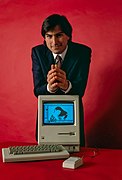Portal:Internet
The Internet PortalSelected article
Wikipedia is a multilingual, open content, free encyclopedia project operated by the non-profit Wikimedia Foundation. Its name is a portmanteau of the words wiki (a type of collaborative website) and encyclopedia. Launched in 2001, it is the largest, fastest growing and most popular general reference work currently available on the Internet. As of December 2007, Wikipedia had approximately 9 ¼ million articles in 253 languages, comprising a combined total of over 1.41 billion words for all Wikipedias. The English Wikipedia edition passed the 2,000,000 article mark on September 9, 2007. Wikipedia's articles have been written collaboratively by volunteers around the world and the vast majority of them can be edited by anyone with access to the Internet. Critics have questioned Wikipedia's reliability and accuracy, citing its open nature. The criticism is centered on its susceptibility to vandalism, such as the insertion of profanities or random letters into articles, and the addition of spurious or unverified information; uneven quality, systemic bias and inconsistencies; and for favoring consensus over credentials in its editorial process. Scholarly work suggests that vandalism is generally short-lived. When Time Magazine recognized "You" as their Person of the Year 2006, Wikipedia was the first particular "Web 2.0" service mentioned, followed by YouTube and MySpace.
Selected picture Metropolitan area networks, or MANs, are large computer networks usually spanning a city. They typically use wireless infrastructure or Optical fiber connections to link their sites. News
Wikinews Internet portal
WikiProjects
Did you know (auto-generated) -
Selected biography
Albert Arnold "Al" Gore, Jr. (born March 31, 1948) was the forty-fifth Vice President of the United States, serving from 1993 to 2001 under President Bill Clinton. Gore previously served in the U. S. House of Representatives (1977–85) and the U. S. Senate (1985–93), representing Tennessee. He was the Democratic Party presidential nominee in the 2000 election, and shared the 2007 Nobel Peace Prize with the Intergovernmental Panel on Climate Change for his work as an environmental activist. Gore has been involved with the development of the Internet since the 1970s, first as a Congressman and later as Senator and Vice-President. His High Performance Computing and Communication Act of 1991 (often referred to as the Gore Bill) was passed on December 9, 1991 and led to the National Information Infrastructure (NII) which Gore referred to as the "information superhighway." Leonard Kleinrock, a key player in the development of the ARPANET, considers the act to be a critical moment in Internet history. Internet pioneers Vint Cerf and Bob Kahn stated in the 2000 article "Al Gore and the Internet", that Gore was "the first political leader to recognize the importance of the Internet and to promote and support its development."
General images -The following are images from various internet-related articles on Wikipedia.
Selected quoteMore Did you know...
Main topics
Featured contentCategoriesRelated portalsThings you can do
Associated WikimediaThe following Wikimedia Foundation sister projects provide more on this subject:
Wikipedia's portals |





















































